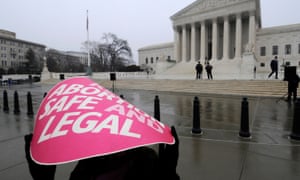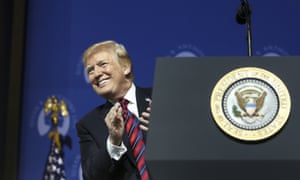Extract from The Guardian
The president has appointed an array of judges who are anti-choice,
anti-union, anti-immigrant and pro-gun. They could cause permanent harm
Last Tuesday, Donald Trump
addressed the Susan B Anthony List at its 11th annual Campaign for Life
gala. His theme was the many successes of his administration and, most
importantly, the need to rally voters to be sure that Republicans
successfully maintained control of the House and the Senate in the
November 2018 midterm elections. In speaking to this audience of
faithful supporters identified as “pro-life” voters, he said: “Now, for
the first time since Roe v Wade, America has a pro-life president, a
pro-life vice-president, a pro-life House of Representatives, and 25
pro-life Republican state capitols.”
In the same speech he touted his great success in judicial appointments with the following words: “We’ve appointed a record number of judges who will defend our constitution and interpret the law as written. And we’re putting on to the bench a record number of judges. And in a short period of time, we are going to have probably the all-time record for the appointment of judges. And I’m very excited about that.”
This speech tells you exactly what you need to know about this president’s goal and his desire to define his legacy. As is well known by now, what he says yesterday he reverses tomorrow. At one time, Trump supported a woman’s right to choose. That is long gone. His goal today is nothing less that the undoing of Roe v Wade, the US supreme court decision that allowed a woman the right to obtain an abortion. He will not be satisfied until he can stack the lower federal courts – and eventually the supreme court – with judges who will overturn that precedent.
"Appointments to the federal bench continue to be the president’s most consistent success, a rallying cry for his base"
If the Republicans prevail in the midterm elections and retain control of the House and, more importantly, the Senate, the relentless march to appoint conservative judges will continue at record speed. Six months ago I authored an article for the Guardian titled ‘Trump’s new team of judges will radically change American society’.
At that time, the president had made 60 judicial nominations and 14 judges had been confirmed. Current figures reveal that the appointments to the federal bench continue to be the president’s most consistent success, a rallying cry for his base, and a campaign issue in the forthcoming election. They are poised to be his lasting legacy.
Many of the president’s actions can be easily overturned by a new
president, just as Trump has erased so much of what Barack Obama
achieved. But one thing that cannot be altered by a new president is the
lifetime appointments to the federal bench, which will shift the
balance of power in the courts for the next two generations.
When Obama took office, there were 53 vacancies, equivalent to 6% of the federal judiciary. But because Republicans obstructed Obama’s judicial nominees in the hopes of providing a Republican president an opportunity to remake the federal courts, Trump began his term with 112 vacancies.
When Senate Republicans were in the majority from 2015-2016, they blocked nine Obama nominees from receiving a hearing because they had not received the consent of their home-state senators. Now that there is a Republican president, Senate Republicans have reversed their position and have advanced three Trump nominees despite their failure to obtain approval from home-state senators.
Thirty-nine Trump judges have now been confirmed, 15 for the circuit courts and 24 for the district courts. One hundred and sixty vacancies remain to be filled, with 71 nominations now pending before the Senate and 89 vacancies yet to be filled. This is more than 15% of the federal bench. As noted in a 22 May report issued by Senate judiciary committee Democrats, the pace of confirmations has set a record. Trump’s first 15 circuit court nominees took an average of 131 days to be confirmed, while Obama’s first 15 circuit court nominees took at average of 254 days to be confirmed – which is twice as long.
A recent study by the Pew Research Center noted an average of 23 votes against each confirmed Trump judge. Obama’s nominees had an average of six no votes; George W Bush’s nominees averaged two no votes; Clinton’s averaged one; and only one no vote was cast against any judge nominated by John F Kennedy.
A record number of Trump nominees have received a “not qualified” rating from the American Bar Association (ABA), or the tepid rating of “qualified” as opposed to the “well qualified” rating of the vast majority of Obama’s nominees. Finally, Trump’s choices reflect a lack of diversity. Ninety percent of his nominees are white, and only 20% are women. Not a single African American or Hispanic person has yet been confirmed. Only 3% of pending nominees are African American and 6% are Hispanic.

In the same speech he touted his great success in judicial appointments with the following words: “We’ve appointed a record number of judges who will defend our constitution and interpret the law as written. And we’re putting on to the bench a record number of judges. And in a short period of time, we are going to have probably the all-time record for the appointment of judges. And I’m very excited about that.”
This speech tells you exactly what you need to know about this president’s goal and his desire to define his legacy. As is well known by now, what he says yesterday he reverses tomorrow. At one time, Trump supported a woman’s right to choose. That is long gone. His goal today is nothing less that the undoing of Roe v Wade, the US supreme court decision that allowed a woman the right to obtain an abortion. He will not be satisfied until he can stack the lower federal courts – and eventually the supreme court – with judges who will overturn that precedent.
"Appointments to the federal bench continue to be the president’s most consistent success, a rallying cry for his base"
If the Republicans prevail in the midterm elections and retain control of the House and, more importantly, the Senate, the relentless march to appoint conservative judges will continue at record speed. Six months ago I authored an article for the Guardian titled ‘Trump’s new team of judges will radically change American society’.
At that time, the president had made 60 judicial nominations and 14 judges had been confirmed. Current figures reveal that the appointments to the federal bench continue to be the president’s most consistent success, a rallying cry for his base, and a campaign issue in the forthcoming election. They are poised to be his lasting legacy.
When Obama took office, there were 53 vacancies, equivalent to 6% of the federal judiciary. But because Republicans obstructed Obama’s judicial nominees in the hopes of providing a Republican president an opportunity to remake the federal courts, Trump began his term with 112 vacancies.
When Senate Republicans were in the majority from 2015-2016, they blocked nine Obama nominees from receiving a hearing because they had not received the consent of their home-state senators. Now that there is a Republican president, Senate Republicans have reversed their position and have advanced three Trump nominees despite their failure to obtain approval from home-state senators.
Thirty-nine Trump judges have now been confirmed, 15 for the circuit courts and 24 for the district courts. One hundred and sixty vacancies remain to be filled, with 71 nominations now pending before the Senate and 89 vacancies yet to be filled. This is more than 15% of the federal bench. As noted in a 22 May report issued by Senate judiciary committee Democrats, the pace of confirmations has set a record. Trump’s first 15 circuit court nominees took an average of 131 days to be confirmed, while Obama’s first 15 circuit court nominees took at average of 254 days to be confirmed – which is twice as long.
A recent study by the Pew Research Center noted an average of 23 votes against each confirmed Trump judge. Obama’s nominees had an average of six no votes; George W Bush’s nominees averaged two no votes; Clinton’s averaged one; and only one no vote was cast against any judge nominated by John F Kennedy.
A record number of Trump nominees have received a “not qualified” rating from the American Bar Association (ABA), or the tepid rating of “qualified” as opposed to the “well qualified” rating of the vast majority of Obama’s nominees. Finally, Trump’s choices reflect a lack of diversity. Ninety percent of his nominees are white, and only 20% are women. Not a single African American or Hispanic person has yet been confirmed. Only 3% of pending nominees are African American and 6% are Hispanic.

Vitter’s record is abysmal. She spent the first six years of her legal career as an assistant district attorney in New Orleans, where she rose within four years to the position of chief of trials. During those years that office was repeatedly criticized by the courts for failing to comply with its constitutional obligation to provide exculpatory information to defense counsel in criminal cases. Justice Ruth Bader Ginsburg described that office as “deliberately indifferent to what the law requires”.
Vitter routinely sought the toughest sentence against black defendants – including the death penalty – but not equally against white defendants. She often criticized judges who gave less than maximum sentences. She then spent one year as an associate in a law firm. She has only appeared once in federal court.
She then retired from practicing law for the next 20 years, spending those years working on her husband’s political campaigns. She has consistently opposed abortion rights, going so far as to claim that using birth control pills exposes women to sexual assaults and that contraception causes breast cancer. Neither proposition has any scientific support.
Finally, Vitter failed to disclose speeches and publications to the Senate judiciary committee that disclosed her virulent anti-abortion views.
Ryan Bounds, a 45-year-old lawyer from Oregon, and a longtime member of the very conservative Federalist Society, has been nominated to the powerful and influential ninth circuit court of appeals. He has failed to obtain the support of either senator from Oregon. Nonetheless, he was nominated on 7 September 2017 and had a Senate judiciary committee hearing on 9 May 2018.
He has received only a “qualified” rating from the ABA. While he did graduate from Stanford University and Yale Law School and has served as a federal court law clerk and federal prosecutor, he has left only a sparse paper trail. He was a deputy assistant attorney general in the George W Bush administration but papers from that era are not publicly available.
The available materials consist of many articles written during his student years that reveal deeply conservative views. He has belittled campus sexual assaults, attacked the concepts of multiculturalism on college campuses, called student affinity groups “feel good ethnic hoedowns” and mocked students engaged in pro-labor protests. In short, he fits well within Trump’s view of the ideological qualifications for a position on a court of appeals.
There are many nominees and confirmed judges who are similar to Vitter and Bounds. Many, if not most, are opposed to abortion rights, labor unions and gun control, and support limiting immigrants’ and prisoners’ rights. The damage to the federal judiciary that will take place in Trump’s four years is of great concern. The pace of confirmation will slow if the Senate flips to Democratic control – but the irreversible harm will be completely devastating should this president remain in office for eight years.
- Shira A Scheindlin is a former United States district judge for the southern district of New York. She is a member of the board of the American Constitution Society and of the Lawyers’ Committee for Civil Rights Under Law

No comments:
Post a Comment